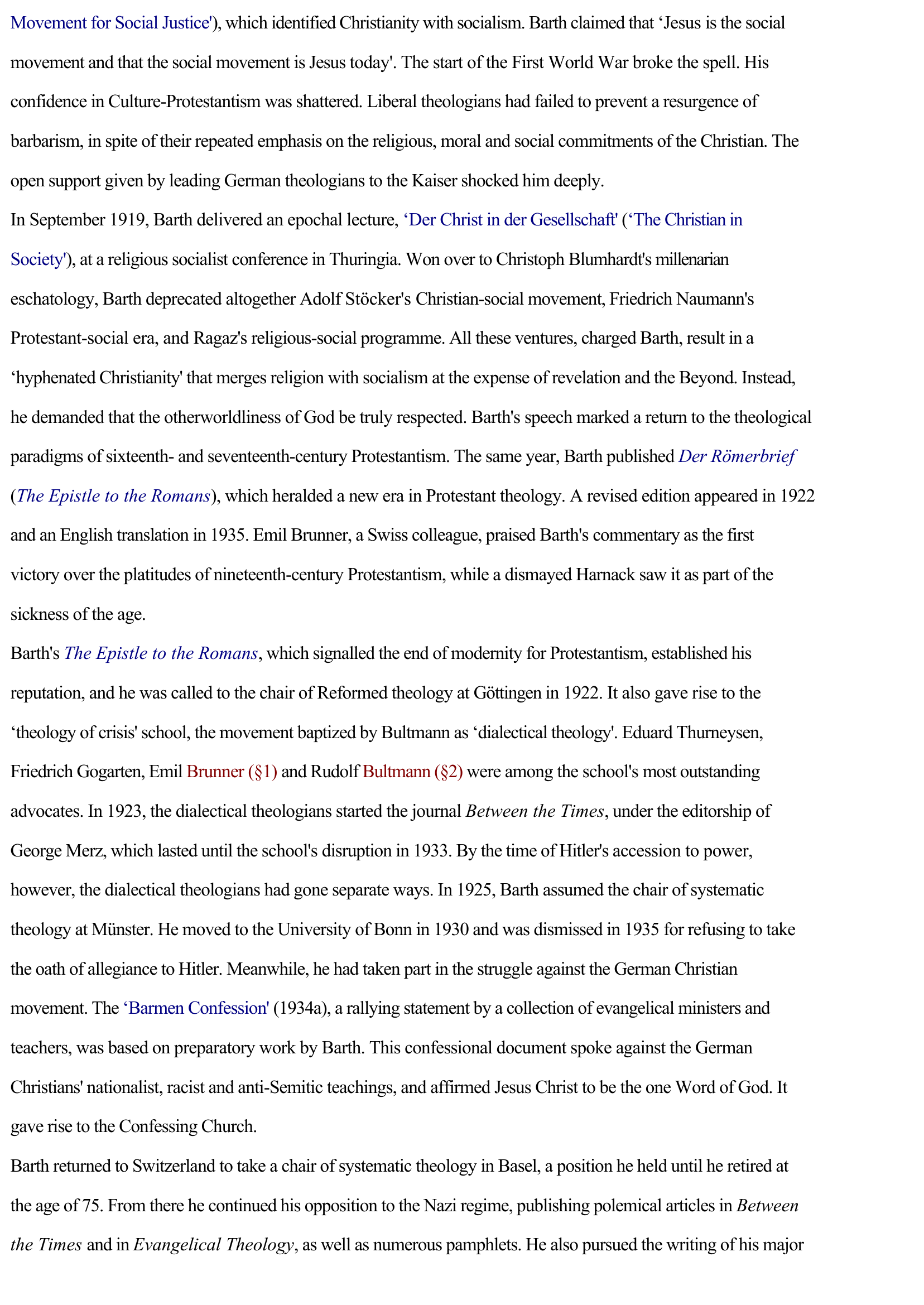Barth, Karl
Publié le 22/02/2012

Extrait du document
«
Movement for Social Justice' ), which identified Christianity with socialism.
Barth claimed that ‘Jesus is the social
movement and that the social movement is Jesus today' .
The start of the First World War broke the spell.
His
confidence in Culture-Protestantism was shattered.
Liberal theologians had failed to prevent a resurgence of
barbarism, in spite of their repeated emphasis on the religious, moral and social commitments of the Christian.
The
open support given by leading German theologians to the Kaiser shocked him deeply.
In September 1919, Barth delivered an epochal lecture, ‘Der Christ in der Gesellschaft' (‘The Christian in
Society' ), at a religious socialist conference in Thuringia.
Won over to Christoph Blumhardt's millenarian
eschatology, Barth deprecated altogether Adolf Stöcker's Christian-social movement, Friedrich Naumann's
Protestant-social era, and Ragaz's religious-social programme.
All these ventures, charged Barth, result in a
‘hyphenated Christianity' that merges religion with socialism at the expense of revelation and the Beyond.
Instead,
he demanded that the otherworldliness of God be truly respected.
Barth's speech marked a return to the theological
paradigms of sixteenth- and seventeenth-century Protestantism.
The same year, Barth published Der Römerbrief
(The Epistle to the Romans ), which heralded a new era in Protestant theology.
A revised edition appeared in 1922
and an English translation in 1935.
Emil Brunner, a Swiss colleague, praised Barth's commentary as the first
victory over the platitudes of nineteenth-century Protestantism, while a dismayed Harnack saw it as part of the
sickness of the age.
Barth's The Epistle to the Romans , which signalled the end of modernity for Protestantism, established his
reputation, and he was called to the chair of Reformed theology at Göttingen in 1922.
It also gave rise to the
‘theology of crisis' school, the movement baptized by Bultmann as ‘dialectical theology' .
Eduard Thurneysen,
Friedrich Gogarten, Emil Brunner (§1) and Rudolf Bultmann (§2) were among the school's most outstanding
advocates.
In 1923, the dialectical theologians started the journal Between the Times , under the editorship of
George Merz, which lasted until the school's disruption in 1933.
By the time of Hitler's accession to power,
however, the dialectical theologians had gone separate ways.
In 1925, Barth assumed the chair of systematic
theology at Münster .
He moved to the University of Bonn in 1930 and was dismissed in 1935 for refusing to take
the oath of allegiance to Hitler.
Meanwhile, he had taken part in the struggle against the German Christian
movement.
The ‘Barmen Confession' (1934a), a rallying statement by a collection of evangelical ministers and
teachers, was based on preparatory work by Barth.
This confessional document spoke against the German
Christians' nationalist, racist and anti-Semitic teachings, and affirmed Jesus Christ to be the one Word of God.
It
gave rise to the Confessing Church.
Barth returned to Switzerland to take a chair of systematic theology in Basel, a position he held until he retired at
the age of 75.
From there he continued his opposition to the Nazi regime, publishing polemical articles in Between
the Times and in Evangelical Theology , as well as numerous pamphlets.
He also pursued the writing of his major.
»
↓↓↓ APERÇU DU DOCUMENT ↓↓↓
Liens utiles
- DOGMATIQUE Karl Barth (résumé)
- Barth, Karl Barth, Karl (1886-1968), théologien protestant suisse, considéré comme l'un des penseurs chrétiens les plus éminents du XXe siècle.
- Barth Karl , 1886-1968, né à Bâle, théologien protestant suisse d'expression allemande.
- Barth (Karl)
- BARTH, KARL

































